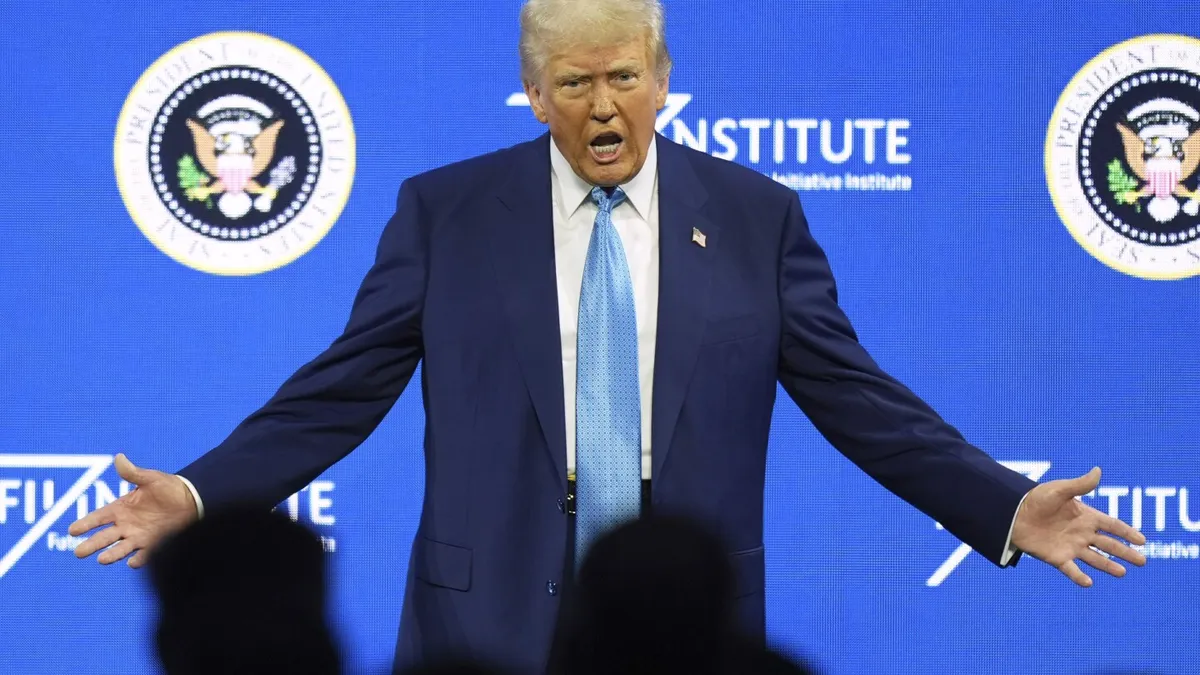
MIAMI (AP) — On Wednesday, President Donald Trump issued a stern warning to Ukrainian President Volodymyr Zelenskyy, emphasizing the urgency to rapidly negotiate an end to Russia’s invasion of Ukraine. Trump cautioned that without swift action, Zelenskyy risks not having a nation to lead.
The rhetoric from Trump towards Ukraine has intensified amidst escalating tensions between the two leaders, and growing discord between Washington and several European nations over Trump’s approach to resolving what is the most significant conflict in Europe since World War II.
Trump’s harsh criticism of Zelenskyy has drawn reactions from both Democrats and Republicans in the United States, a nation where Ukraine’s defense against Russian aggression enjoys bipartisan support. Zelenskyy accused Trump of falling into a Russian disinformation trap, a statement that drew a quick rebuke from Vice President JD Vance, who warned of the dangers of publicly criticizing the new president.
In an extended social media post on his Truth Social platform, Trump lashed out at Zelenskyy, labeling him a “dictator without elections.” Trump criticized Zelenskyy for persuading the United States to spend $350 billion on a seemingly unwinnable war, a war that, according to Trump, Zelenskyy cannot resolve without American support.
The U.S. has committed approximately $183 billion since Russia’s invasion of Ukraine in February 2022, according to the U.S. special inspector general overseeing American assistance to Ukraine.
Trump accused Zelenskyy of being “a dictator without elections” due to delayed elections in Ukraine, originally scheduled for April 2024. He reiterated his criticisms during a meeting in Miami hosted by Saudi Arabia’s sovereign wealth fund, accusing Zelenskyy of misusing American aid and exploiting the Biden administration.
Vance, in an interview with the Daily Mail, criticized Zelenskyy’s approach to Trump, stating that publicly criticizing the president would not change his stance.
Ukrainian officials continue to express concerns about Trump’s strategy. Mykhailo Podolyak, an adviser to Zelenskyy, questioned the rationale behind granting dominance to an aggressor like Russia.
In a recent development, U.S. and Russian officials, meeting in Saudi Arabia, agreed to negotiate a settlement to end the war, excluding Ukrainian and European representatives.
Trump’s comments have sparked varied reactions from U.S. lawmakers. Senate Democratic leader Chuck Schumer expressed disgust at Trump’s apparent siding with Putin, while Senator John Kennedy disagreed with Trump’s implication that Ukraine started the war.
Other prominent figures, such as Senator Dick Durbin, criticized Trump for his perceived alignment with Putin’s narrative, urging him to apologize to Ukrainians, though he doubted such a gesture would occur.
Senate Majority Leader John Thune, who supports Ukraine, noted the need for the Trump administration to have space in pursuing a resolution, emphasizing a peaceful outcome.
Tensions have also arisen over a proposed agreement granting the U.S. access to Ukraine’s rare earth minerals. Ukrainian officials refused to sign the document, citing its focus on U.S. interests without offering specific security guarantees in return.
During his Miami speech, Trump accused Ukraine of breaking the deal, expressing frustration over their refusal to finalize the agreement, despite previous discussions involving Treasury Secretary Scott Bessent.
Retired U.S. Lt. Gen. Keith Kellogg, Trump’s special envoy to Ukraine, acknowledged the prolonged conflict and human suffering, emphasizing Trump’s desire to see an end to the war.
Associated Press correspondents Madhani and Pesoli reported from Washington, with contributions from Susie Blann and Hanna Arhirova in Kyiv.